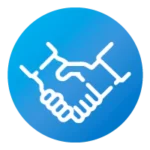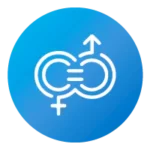
In 2022, the theme for International Women’s Day (IWD) is “break the bias.” It asks us to imagine a world free of stereotypes and discrimination – a theme that fits well with what we’ve covered in years past.
Last year we explored the state of gender equality across the MSP marketplace. We examined the IT industry as a whole, looked at the issues identified by women in the workforce, then tried to identify areas of improvement we could take immediate action on.
Check out last year’s articles here:
One key issue stood out through it all – the bias of gender ratios in IT.
In 2021, our research found that women make up as little as 26% of university-qualified IT graduates.
This point became a focus of our efforts. How could we as a business hope to reach equality when fewer women were interested in joining our ranks?
Our research identified that this gender disparity is partly due to a self-perpetuating loop that’s been in place since IT began as an industry.
We decided that if we were going to walk the talk when it came to equality, it was time to do our part. And that starts in our backyard – by making our little patch of IT as inviting as possible.
Here’s what our respondents thought of our efforts over the past year.
Make recognising and rewarding women’s contributions an everyday experience
Our respondents said that we’re doing a decent job at considering women’s contributions, helping to make them feel valued while not singling out their efforts on a gendered basis.
“I feel that our company contributions are being noticed, and internally our opinions and ideas are taken on board in decision making. We could involve more women in decision-making processes, not just in leadership and managerial positions, but across the company as a whole. That’s something I hope will change as more women choose to work in the IT industry.”
Promoting unbiased hiring processes
Gender equality must be addressed at all stages of the employment cycle, from recruitment to project assignment, yearly performance reviews – and even exit interviews.
“First Focus seems to have found a good balance in successfully hiring more women in IT without them being seen as or feeling like decoration. I want to see our hiring processes used to promote what we offer, rather than just listing what we require of people to join First Focus – and we do have a lot to offer!”
Recognising parents and caregivers
New parents can find themselves at odds with workplace needs. The way forward is to offer generous parental leave and make taking it an expectation – not a privilege – and make it both well-known and easily accessible.
“In my experience, this organisation is very understanding. If you need to take time off or away from work to care for children, you can, and it’s not a big deal. That being said, paternity leave is still only two weeks long. The short timeframe sort of indicates an assumption that the female is the primary carer. While I recognise the commercial reality behind this choice, I’d like to see more done.”
Flexible working arrangements
This arrangement is an option that is not unique to the IT industry. After the COVID-19 pandemic, working from home has become an expectation. And it’s one that parents are embracing.
“I feel that there is an issue related to staff working part-time. These staff – mainly women – feel an expectation to work on days when they are otherwise free. Saying that, the WFH arrangements implemented because of the pandemic now offer concrete policies that support flexible working arrangements. This arrangement drastically improves the accessibility of many jobs at First Focus for female candidates.”
Training
One way of embedding equality in the fabric of an organisation is through training. Not just on equality – but by making training available to anyone who wants it.
“I have had one-on-one training sessions with multiple techs with different skill levels. I have never felt like I was treated differently because of my gender. They were all eager to teach me and help me expand my technical knowledge. We could expand our training sessions to include more soft skills that enable quality. Like training people how to critique or turn down ideas and requests, so there is no confusion between being discriminated against and your ideas just not well suited to the situation.”
It would be remiss of us to ask for input on gender equality and not include suggestions on future actions. So here they are!

“I feel like some people in the industry are afraid to offer praise to women, and I find that weird. We know we need to treat everyone with equal respect, but some people find it hard to do so without feeling like they’re somehow being unfair.”

“I would like to see initiatives and programs that encouraged men to call each other out. It’s exhausting being a spokesperson for your gender.”

“There’s more to do concerning industry pay brackets. We want to know that our daily efforts are rewarded appropriately. Proving that equal pay is part of the normal will help the industry achieve a much better gender balance .”

“While COVID has helped make remote and flexible working the norm, many workplaces still have job ads for roles based out of office locations. Suppose they implement and promote flexible working arrangements? In that case, that may help attract working mothers and other primary caregivers who value their work/life balance.”
Last year, several of our respondents indicated discomfort when asked to participate in female-focused activities. As one respondent explained:
“I appreciate not being on display for being a woman – it makes me feel like a show pony. Women are equals – not more or less than the male gender.”
Perhaps the most challenging part of enabling equality in IT is baking these processes and attitudes into the everyday actions we all undertake. But this year, we’ve listened.
“I love that we’ve changed our approach to International Women’s Day this year. We no longer have to gather up all the women and pose for photos! Even though this organisation truly does seem to value equality, it felt kind of forced. Instead, they’ve listened to our feedback. Now we’re focusing on what we’ve done this past year and what else we can do.”
Equality means people don’t get singled out. Yet, we’ve been singling out women to promote how pro-equality we are in the past.
That stops now.